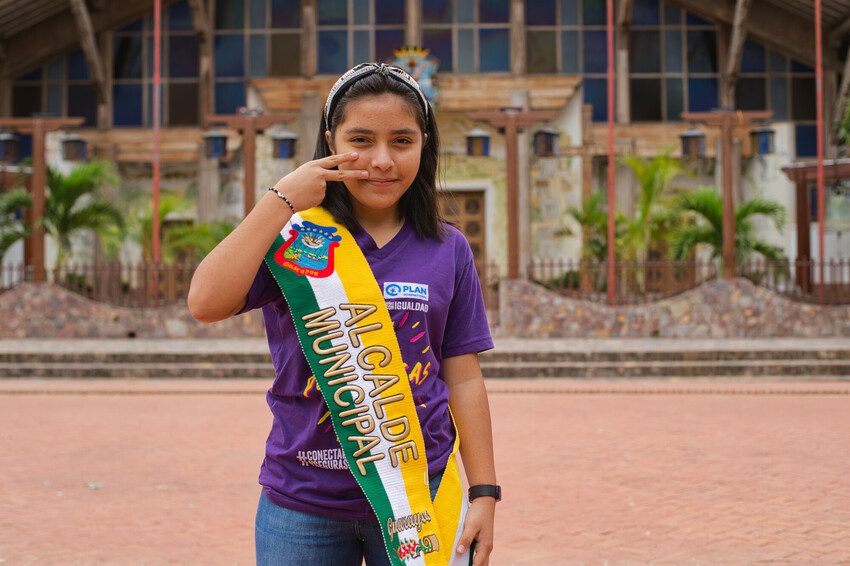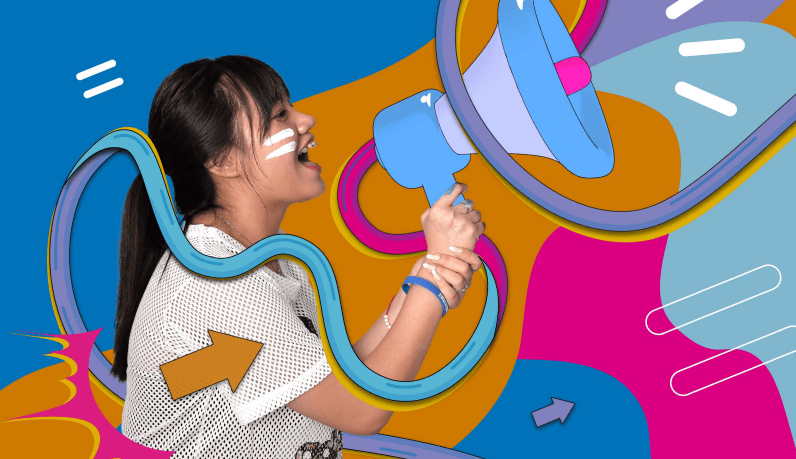Girls and young women silenced in politics
3 October 2022Girls and young women worldwide consistently feel excluded from politics, according to new research by Plan International.

Yordana, 12, is child mayor of her municipal in Bolivia.
A survey of 29,000 girls and women aged 15-24, from 29 countries, found that respondents face significant barriers when taking part in political activities and feel poorly represented by the politicians elected to serve them.
Only half believe that people in their community view it as acceptable for girls and young women to engage in political activities and 19% have personally been discouraged from doing so.
Just 34% think politicians act on the issues that matter to them and only 11% of those surveyed are happy with their leaders’ decisions in those areas.
Equal Power Now
The report, called Equal Power Now: Girls, Young Women and Political Participation, is released ahead of International Day of the Girl and is based on a survey of adolescent girls and young women from countries ranging from Kenya to the USA to Brazil. In-depth interviews were also carried out with girls and young women in 18 countries.
It found that a clear majority care significantly about politics, with 97% of those surveyed agreeing that participating in politics is important and 83% saying they have personally done so.
Men and boys are encouraged just by nature to be in those spaces whereas as a female, you feel that space isn’t made for you.
Anna*, 23, Germany
But despite this, girls and young women are frequently shut out of political processes because of their age and gender, with 31% saying they do not feel politics is open to their participation.
Nearly 45% of those surveyed think politicians fail to understand their views. Amongst those who belong to an ethnic minority group, identify as LGBTQ+ or having a disability, this figure rises to 59%.
Girls and young women denied access to politics
Stephen Omollo, Plan International’s Chief Executive, said: “Our research, which represents the views of thousands of girls and young women across countries with different cultures, income levels and civic contexts, has found that overwhelmingly, girls are political. But they are still being denied the right to shape the decisions which impact their lives most.
“As children and young people, they are being wrongly dismissed as being ‘too young’ to add value. At the same time, they continue to be held back by deep-rooted inequalities which mean girls and young women face more and different obstacles to access decision-making spaces than boys and young men. These challenges are compounded even further if girls also come from poverty, from an ethnic minority or identify as LGBTQ+.
“Despite this, we’re seeing girls and young women redefining what it means to be political, persevering against the odds to take part in formal political processes and also championing diverse youth movements, grassroots activism and collective action. Politicians and other power holders must stand with girls as they change the face of politics.
“It’s critical that girls and young women’s voices are heard. Critical as a right, critical to the policies and decisions that shape their lives, and critical to achieving gender equality.”
Globally, political leadership and representation remains heavily dominated by men with only 26% of national parliamentarians being women** and only 1% women under 30**.
Politics remains dominated by men
Of those surveyed, 32% say that they do not see any politicians that inspire them to participate in politics.
Another 40% believe that female politicians suffer abuse and intimidation and that they are judged for how they look or dress.
In the words of Anna*, 23, from Germany, “Men and boys are encouraged just by nature to be in those spaces whereas as a female, you feel that space isn’t made for you.”
Aurora*, 20, from Ecuador, said: “For generations we have been sold this image… if they make me close my eyes and imagine a political person… I would have immediately thought of a man with a tie, because those are the images that are thrown at us… So, it’s hard for people to believe that a woman… can manage to be in these spaces. It’s a kind of behaviour that we have learnt from generation to generation.”
Despite this, 56% of girls who are of voting age have voted in a local or national election and 20% say they can see themselves standing for political office in future.
Youth manifesto: Equal Power Now

Ahead of International Day of the Girl, Plan International has published a Youth Manifesto written by young activists which calls on politicians and other leaders worldwide to support girls and young women to participate in politics.
This includes increasing civic education, creating more policies and strategies that facilitate the meaningful participation of girls in politics, and adopting a zero-tolerance approach to violence against female politicians and activists.
This manifesto sits at the heart of Plan International’s Girls Get Equal campaign, which calls for a world where girls in all their diversity are equally able to make decisions about their own lives and shape the world around them.
*Names have been changed
**Plan International is not responsible for content on external websites
Categories: Campaigns, Youth empowerment


